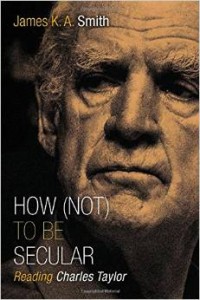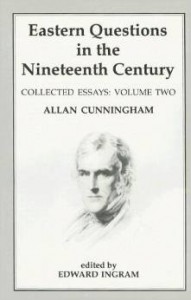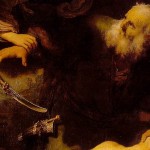
Yesterday’s piece on Ryan Bell (the pastor who became an atheist) made it seem like the Friendly Atheist demythologized the pastor’s conversion by focusing on the confirmation bias built into his project. There wasn’t enough space to discuss the rest of the piece. The following passage from the piece betrays an epistemological naivete:
So, over the past year, Bell critically analyzed the beliefs he grew up with — and professed from the pulpit — and realized that the evidence just didn’t support it.
If only more people had the courage to put their faith under such scrutiny.
Bell isn’t necessarily an “enthusiastic” atheist, but neither are millions of other Americans out there. He also doesn’t claim to be certain about his atheism — but that’s also on par with most atheists: We’re open to evidence for God’s existence. We just don’t think there is any.

There is more to it than merely the evidence. Bell tried on a way of life (atheism) to the exclusion of another way of life (Seventh Day Adventism). As a matter of fact, he performed a reversal of what an older Christian vocabulary calls discernment. The active bracketing off and repression of his former beliefs could only confirm the bias he already had for atheism–as he explains in another recent interview.
Beliefs are much more complicated than mere epistemic beliefs. Atheists will only come to question their beliefs and practices if they follow Pascal’s advice and start taking holy water, have Masses said, etc.
If only they had the courage to put their lack of faith under such scrutiny!
Confirmation bias is also at the forefront of another trending news story in the wake of the Charlie Hebdo attack in Paris. Commentators are predictably jumping at the connection between Islam and violence. Claiming that Islam is an inherently violent religion seems to be de rigueur in op-eds all around the world.
The recent origins of the stereotype get lost easily. This stereotype is a convenient cover for waging war against oil rich countries (Iraq) and countries who are located in geopolitical neuralgic points (Afghanistan is near Iran, India, China, and Russia). The last country in that parenthetical list is very significant.
We forget how in the 1980’s the Reagan administration supported the “Freedom Fighters” of Afghanistan (a.k.a. the Taliban) in the fight against Soviet-Russian state terrorism. Remember also how Saddam’s Iraq was our ally in his war against the extremism of Iran? Iran was a close Soviet ally after American hegemony was broken by the Islamic revolution. In 1979 the Soviet Union was the very first state to recognize the Ayatollah’s Islamic Republic. The Soviet Union, and then the Russian state that succeeded it, are behind the Iranian nuclear program, which is the major bone of contention between Iran and the United States.
The view of Islam as a possible ally against Russian, that is, Western extremism go much deeper than that. They go at least as far back as the 19th century when Islamic countries were the West’s close allies against the real threat Czarist Russia posed for the West.
The Washington Post article “When the West Wanted Islam to Curb Christian Extremism” points to this uncomfortable truth:
And so, among diplomats and in the press, a Russophobic narrative began to emerge. It was ideological, a clash of civilizations. After all, beginning with the Catherine the Great in the late 18th century, the Russians had framed their own conquests in religious terms: to reclaim Istanbul, once the center of Orthodox Christianity, and, as one of her favorite court poets put it, “advance through a Crusade” to the Holy Lands and “purify the river Jordan.”
That sort of Christian zeal won little sympathy among other non-Orthodox Christians. Jerusalem in the 19th century was still the site of acrimonious street battles between Christian sects, policed by the exasperated Ottomans. Russian Orthodox proselytizing of Catholics in Poland infuriated European Catholic nations further west, such as France.
Baron Ponsonby, the British ambassador to Istanbul for much of the 1830s, decided the job of thwarting Russian expansionism was a “Holy Cause.” An article in the “British and Foreign Review” pamphlet, circulated in Britain in 1836, saw the Ottomans as “the only bulwark of Europe against Muscovy, of civilization against barbarism.” Russia represented, in some accounts, a backward, superstitious society where peasants still labored in semi-slavery and monarchs ruled as tyrants, unchallenged by parliaments and liberal sentiment. The Ottomans, who were embarking on their own process of reform, looked favorable in comparison.

Some writers of the time went even further and presented Islam as a potential civilizing influence upon Western Europe itself. Here is David Urquhart:
What traveler has not observed the fanaticism, the antipathy of all these [Christian] sects – their hostility to each other? Who has traced their actual repose to the toleration of Islamism? Islamism, calm, absorbed, without spirit of dogma, or views of proselytism, imposes at present on the other creeds the reserve and silence which characterize itself. But let this moderator be removed, and the humble professions now confined to the sanctuary would be proclaimed in the court and the military camp; political power and political enmity would combine with religious domination and religious animosity; the empire would be deluged in blood, until a nervous arm – the arm of Russia – appears to restore harmony, by despotism.
Does this mean the West should swing fully the other way and orientalize Islamic civilization as exclusively peaceful? Hardly. The picture is much more complicated as I’ve argued before here.
Most importantly, there is no such thing as a uniform Islamic civilization that might be either violent or peaceful–just as there is no stereotypically uniform Catholicism. Coming to terms with this basic fact will go a long way to prevent confirmation bias against the unicorn we call “Islam.”
The essay “Challenging Radical Islam” gets across the ambiguity of how much our confirmation bias against Islam, painting it as exclusively violent, only encourages its radical elements:
We need to strongly resist the view that Islam is the problem, that the Qur’an is the problem, that Muhammad is the problem. To denounce Islam as a death-loving religion—or the Qur’an and Muhammad as a constitution and example, respectively, for terrorists—provides excuses for twisted zealots. It reinforces their deluded belief that they and only they are the true Muslims. Moreover, it inspires fear and mistrust among the great majority of Muslims, who are not jihadists. If the Qur’an and Islam are the problems, what is the solution? Drop bombs on the Ka’bah in Mecca? Ban the use of the Qur’an?
I never get tired of quoting my favorite Russian fictional character:
We are all responsible for all.
Interestingly enough, given recent trends in religious practice, Russia is becoming increasingly Muslim. Now how would the West react to the realization of the possibility of Russia becoming a majority Muslim state? Who would the West scapegoat first? Or would that be the perfect storm?
In fine, in face of all of this, I continue to insist Islam does not need a Reformation.
https://www.youtube.com/watch?v=BylHdkuxmec
If you’d like to explore more of the issues surrounding what I’ve written about here, check out my TOP10 Religion and World Politics List.












